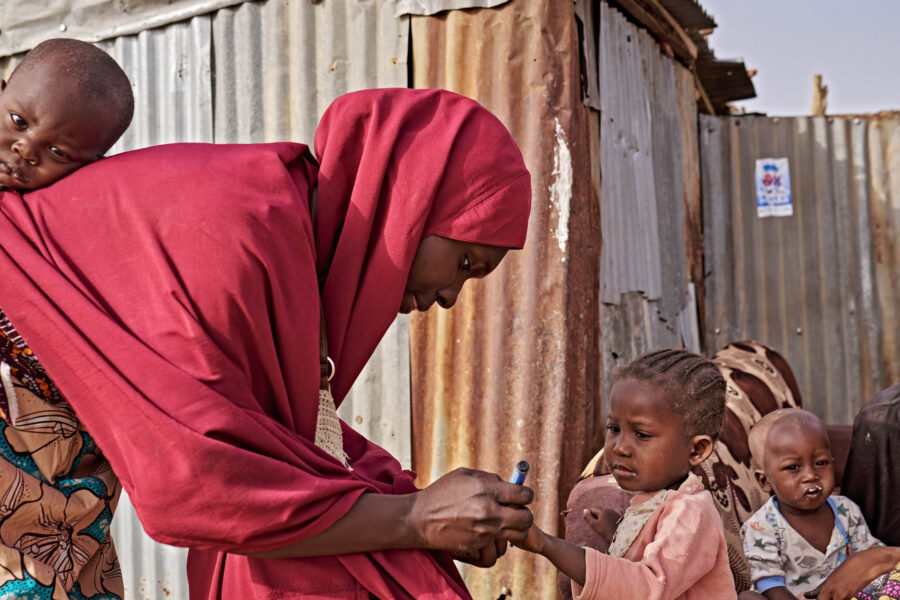Building accountability to achieve feminist climate justice
Feminist climate justice seeks a world where everyone can flourish on a healthy and sustainable planet, where those in power serve and are accountable to all, particularly marginalized groups such as women and girls. Achieving this will take action on many fronts – to strengthen democracy, human rights, and global collaboration
Gender — Global

Ending environmental destruction and reversing climate change, including the implementation of the landmark Paris Agreement, are an integral part of the Sustainable Development Goals. In the latest assessment of progress, the Global Stocktake, governments acknowledged their collective failure to limit global warming to 1.5°C. In fact, the UN’s latest assessment is that we are on track to double that increase by the end of this century on a planet that will become less and less habitable.
We stand at a critical juncture. Activists have long called for faster and bolder action, with women, often indigenous or young women, at the forefront of these demands. Under the banner of feminist climate justice, they have envisioned a world in which care for people and planet is prioritized over corporate profits and elite power. UN Women has aligned itself with these demands. Our latest publication, Feminist climate justice: A framework for action, explores what policymakers need to do to achieve this vision in practice.
As well as the nuts and bolts of policy, the framework document also looks at why progress has been so slow. If the evidence is clear and the vision compelling, what accounts for the weak response of governments? What is blocking the deep transformations needed to ensure our collective survival and a just and sustainable future for all? In short, how do we ensure accountability for climate action?
The path to accountability for feminist climate justice is fraught with unequal power dynamics and bottlenecks to progress. We identify three major areas where action is needed, showcasing the pathways feminist movements are already actively pursuing.
Prioritize human rights-based approaches over market-centric solutions
Achieving feminist climate justice requires a shift away from prevailing economic models that prioritize profit over people, perpetuating environmental degradation and gender inequalities. Yet implementing climate commitments persistently favors market-based solutions, while leaving corporations largely unchecked and poorly regulated. As a result, women’s priorities are often sidelined. Take, for example, women smallholder farmers in the Global South. They produce 30% of the world’s food but are often shut out of value chains dominated by global agribusiness, which is also responsible for the decimation of biodiversity. Action by and accountability of the private sector are both sorely needed. But the sector’s presence in global climate talks has, for the most part, been characterized by evasion of its responsibilities and greenwashing.
We should turn things on their head and prioritize the needs of marginalized groups that bear the brunt of the climate crises over market-centric fixes, which only promise more of the same. Sustainable solutions that create multiple wins are needed. School feeding programs, for example, address children’s hunger while generating opportunities for small-scale women farmers to provide nutritious food, produced in environmentally sustainable ways. Since women are usually responsible for providing food for their households, these programs also support family incomes and reduce women’s unpaid work.
A human-rights approach also requires public finance that recognizes the historical responsibility of the Global North for the lion’s share of global emissions. The promise of USD 100 billion in annual climate finance, made by donor countries in 2009, is still unfulfilled. What little finance is available does not reach women in the most vulnerable countries, and is typically provided as loans, trapping countries in the Global South in a vicious cycle of debt, austerity, and climate crises.
Alongside the right policies and adequate financing, bottom-up accountability tools can ensure that policies are implemented in ways that include women and are attentive to their needs. For instance, participatory budgeting and gender-responsive climate budgeting – being tested in Bangladesh, Indonesia, Nepal, Benin, and Rwanda – are showing promise in revealing where resources are going, and providing the evidence that policymakers need to direct finance to gender-responsive climate policies and programs. UN Women, in collaboration with the International Union for Conservation of Nature (IUCN) and the Kaschak Institute for Social Justice for Women and Girls, is launching a gender equality and climate policy scorecard. This will systematically monitor gender-responsive national climate policies, further contributing to accountability efforts.
Strengthen democracies as the basis for progressive climate decision-making
While such tools are important, accountability can only be achieved through the strengthening of democratic states and processes. At a time when combating climate change requires global cooperation and robust, democratic state action, the power and legitimacy of both have been seriously curtailed. Indeed, in a year in which billions of people will go to the polls, the strength of democracy globally has declined to levels not seen since the Cold War. Significant declines in measures of women’s rights to open dialogue, media freedom, and the conduct of free and fair elections across the globe have been registered. This has not only limited space for the vital work of civil society organizations but has also led to alarming levels of distrust in public institutions and expert knowledge, creating fertile ground for climate denialism and exclusionary and misogynist leaders.
Countering exclusionary politics and top-down decision-making means reinvigorating democratic institutions and multilateralism. Urgent reform of the international financial architecture, as advocated by the United Nations Secretary-General, is essential to ensure democratic decision-making and gender balance in multilateral spaces. At the national level, women’s rights and autonomous women’s organizations are central to the health and strength of democracies. Feminists have been instrumental in spearheading pro-democracy movements. They have advocated for climate planning and implementation that is participatory and inclusive, while recognizing the link between women’s representation in parliaments and stronger climate change policies. Governments will submit a new round of nationally determined contributions (NDCs) in 2025, which provides an opportunity to ensure that women’s ministries and civil society organizations are at the table. Supporting grassroot initiatives and movements, including feminist organizations, and ensuring they are well resourced are key to enriching democratic deliberations and alternatives.
Foster solidarity across classes, borders, and hemispheres
Averting environmental destruction requires “all hands on deck.” We urgently need to build solidarity between social groups, economic classes, and countries. However, deepening socio-economic inequalities, patriarchal political discourses, and colonial legacies contribute to fragmentation, hindering collective action. Women activists face immense challenges, enduring violence and too often paying with their lives for defending their livelihoods and precious ecosystems.
To counteract this, action is needed to promote coalitions and protect civic space. In climate negotiations, alliances among states can bridge geopolitical divisions, to elevate ambitions and create mutual accountability. The High Ambition Coalition, for example, was a Member State coalition that proved critical to getting the Paris Agreement over the line. Following a request by 132 countries, the International Court of Justice has agreed to provide an advisory opinion concerning climate change, which should clarify states’ human rights obligations. At regional level, collaborations between feminists, indigenous groups, and environmental movements have resulted in landmark accords, such as the Escazú Agreement in Latin America and the Caribbean. The agreement prevents, for the first time, the criminalization of environmental human rights defenders.
Overcoming accountability bottlenecks is an essential part of the journey toward feminist climate justice. The journey requires concerted efforts, collective action, and a steadfast commitment to promoting human rights and care. Accountability, rooted in inclusive democracy, will be the driving force that transforms aspirations into tangible and lasting change.





